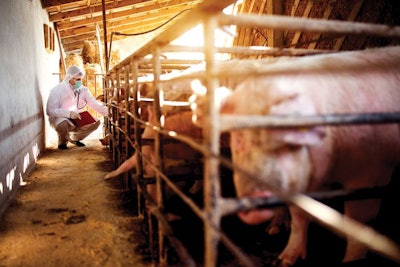
With outbreaks of African swine fever (ASF) already confirmed in seven Asian states — Cambodia, China, Laos, Mongolia, Myanmar, North Korea and Vietnam — authorities in the Philippines have been warning for some time of threat of the disease to its pig farming sector.
Within the past few days, owners of backyard pigs in the Luzon area have reported a sudden increase in mortality in their animals, according to the Department of Agriculture. The Philippines’ newly appointed Agriculture Secretary William D. Dar has announced that samples of affected animals are being investigated by international animal health diagnostic labs, and he has called on local officials to step up controls of pig movements and disease surveillance in their areas.
In a bid to prevent the spread of any infection, Bohol province in the Central Visayas Region has banned all imports of live pigs and pork products, unless they are accompanied by a health certificate from a licensed veterinarian, and an appropriate shipping permit, reports Inquirer.
Outbreaks of ASF have also been reported in the provinces Bulacan and Rizal in the Philippines, according to Taiwan’s ASF emergency operations center. Hand luggage of all passengers from the Philippines entering Taiwan at Taoyuan airport is now being checked for pork products, reports Focus Taiwan. Additional checks have been in place for all international passengers at Taiwan’s other airports for some time.
ASF returns to Laioning in China
Three consignments of pigs checked by officials at highway checkpoints on July 26 in the province of Laioning have tested positive for the ASF virus, according to a recent report from the Ministry of Agriculture in Beijing to the World Organisation for Animal Health (OIE). The last outbreak of ASF in the province was in December 2018, and illegal movements of animals are blamed for these latest cases, which occurred in the area near to the border with North Korea, where the disease was first reported in May, although the disease situation there is unknown.
Illegal animal movements were also thought to be behind the detection of the ASF virus in pigs at a highway checkpoint in Guangxi province this month. This is the sixth ASF outbreak to be confirmed in Guangxi since February, although all the previous cases were on local farms or in backyard herds. In the south of China, the province shares a border with Vietnam, where ASF has affected pigs across the country this year.
A fourth outbreak of ASF in the central province of Hubei has also been reported by the Chinese authorities to the OIE. At the end of July, the virus was detected in a backyard herd in Honghu city after three of the animals died.
Latest estimate from the United Nations’ Food and Agriculture Organization (FAO) is that there have been 154 outbreaks of ASF in 32 provinces/regions of China, and that approximately 1.17 million pigs have been culled to halt the spread of the disease.
After previous ASF outbreaks, the agriculture ministry reported that restrictions on the movements of pigs have been lifted in parts of Ningxia, Qinghai, Guangxi, and Guizhou this month.
From Hong Kong, the government of the Special Administrative Area has reported to the OIE that the ASF situation has been “resolved.” The disease was detected in two groups of imported pigs at the Sheung Shui slaughterhouse during May, causing the temporary closure of the facility.
ASF confirmed at 28 farms in Laos
Based on reports to the OIE from the Ministry of Agriculture and Forestry, the number of farms confirmed with ASF in Laos has risen to 28, with outbreaks now recorded in five provinces, as well as the capital, Vientiane.
Recent cases have been in the northern provinces of Phongsaly, Huaphanh, and Xiengkong. In the latter outbreak, source of the infection is suspected to be the introduction of new animals at a livestock market. Although the reason for the other outbreaks is unknown, all three provinces affected border Vietnam and/or China. More than 2,200 animals were lost to the disease through mortality or slaughter in these latest outbreaks in Laos.
First occurrence of ASF in Myanmar
This month, the Ministry of Livestock and Fisheries confirmed to the OIE that the ASF virus had been detected for the first time in Shan, a state in the north of the country, which borders China, Laos and Thailand.
The disease struck a village pig herd of 65 animals on August 14, and it was detected in two backyard groups in the same state over the following days. The authorities report that the infection may have been brought in as the result of pig and pork imports — which are known to have occurred in the area — or as the result of swill feeding, or on fomites.
Vietnam: ASF losses approach 4 million pigs
The number of pigs lost to ASF in Vietnam has risen to about four million, according to the latest report from the FAO.
No official reports on the situation have been reported to the OIE by the country’s animal health agency for more than one month. However, in early August, one outbreak was confirmed in the southern province of Binh Phuoc. About 30 pigs were culled after the ASF virus was detected, reported Vietnam News. The disease has been found in all districts in the province, and more than 5,300 animals have been culled so far in Binh Phuoc alone.
The next week, a senior official at the agriculture ministry said ASF has killed 15% of the country’s pigs — up from a previous estimate of 10% — according to the same source. With reduced supplies and demand high, pork prices have recently risen sharply across Vietnam.
Facing the huge challenges posed by ASF, Vietnamese entrepreneurs are reported to be exploring alternative options to pork production, including the farming of cattle, sheep and goats.
The number of poultry flocks has increased by 7.5% this year, according to Saigon Online, and there has been an 11% rise in egg production. Many former pig farmers have shifted to poultry production as the ASF situation in the country has deteriorated, leading to concerns of another sector collapse in future as overproduction occurs alongside plentiful imports of cheap chicken.
First occurrence of ASF in Russia’s Far East
In the first week of August, the ASF virus was detected for the first time in Russia’s Far Eastern Federal District, according to the country’s animal health agency in an official report to the OIE. Since the first cases at a small farm with 70 pigs in Primorsky Krai, the disease has been found in one backyard herd and two wild boar in the same area, and among approximately 200 animals of a village herd in Amur oblast.
Several ASF outbreaks have been reported in western regions of Russia this year.
View our continuing coverage of the African swine fever outbreak.

















